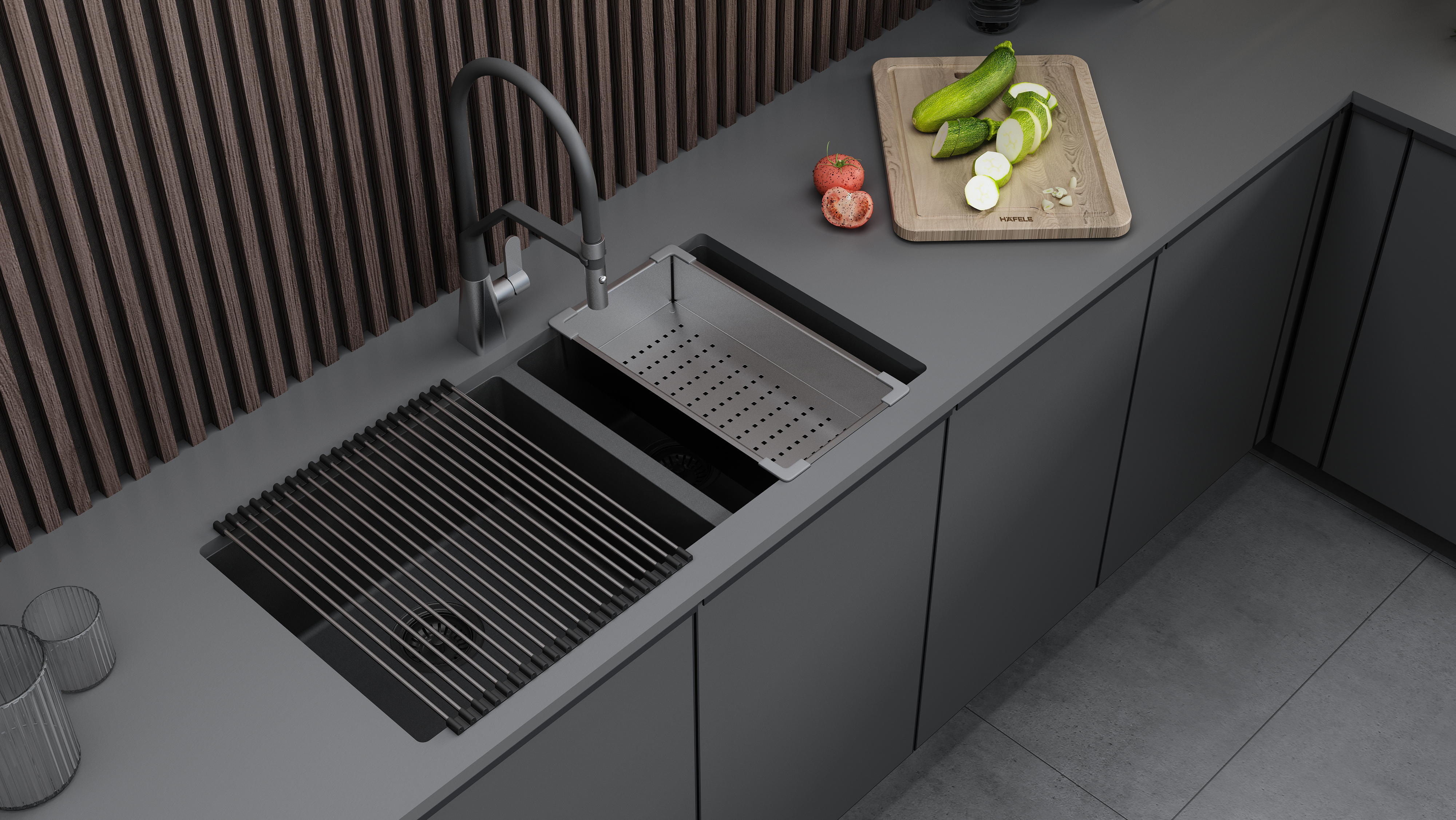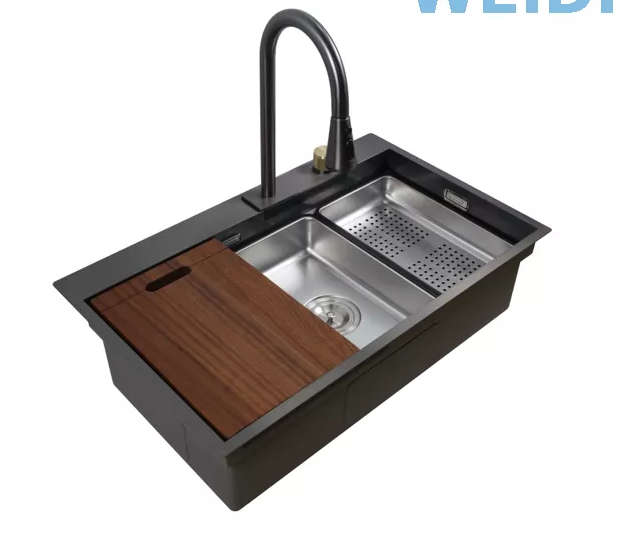Views: 0 Author: Site Editor Publish Time: 2025-06-25 Origin: Site








A kitchen sink smelling like sewer is not only unpleasant but can also signal underlying plumbing issues. This issue is more common than you might think and can be caused by a variety of factors, including food buildup, plumbing failures, or even problems with your garbage disposal.It’s important to act quickly to eliminate the odors, as some causes may pose health risks. Understanding the root cause of the smell is crucial for effective treatment.This article will explore common causes, provide practical solutions, and suggest preventative measures to ensure your kitchen sink remains fresh and free from unpleasant odors.

Explanation: Over time, food scraps and grease accumulate inside your drain pipes. When grease goes down the drain, it hardens and sticks to the sides of the pipes, trapping food particles, soap, and other debris. This creates a breeding ground for bacteria, which produces foul odors.
Prevention Tips:
Regular Cleaning: To prevent buildup, periodically clean your kitchen drain with a combination of baking soda, vinegar, and hot water. This will help break down grease and food particles.
Use a Drain Cover: A drain cover or mesh strainer can prevent large food particles from going down the drain, making it easier to keep the pipes clean.
Avoid Pouring Grease Down the Sink: Always dispose of grease and oils in the trash instead of rinsing them down the sink. This will help reduce the risk of grease buildup in the pipes.
Explanation: Sewer gases, which include methane, hydrogen sulfide, and ammonia, can seep into your home through leaks or malfunctions in your plumbing. These gases have a strong, unpleasant odor often associated with rotten eggs and can pose a health risk if inhaled over time.
Key Causes:
Damaged P-Trap: The P-trap is a U-shaped pipe under your sink that holds water and acts as a barrier to prevent sewer gases from entering your home. If the P-trap is damaged or if the water evaporates, sewer gases can rise up into your kitchen.
Unsealed Pipes or Connections: Loose or improperly sealed pipes can allow sewer gases to escape, causing odors.
Solutions:
Inspect the P-Trap: Regularly check the P-trap for damage or leaks. If the P-trap is cracked or leaking, replace it immediately.
Seal Connections: Ensure that all pipe connections are securely tightened to prevent any gas leaks.
Run Water Regularly: If you have a sink that is rarely used, run water through it every few weeks to prevent the P-trap from drying out and allowing gases to enter.
Explanation: The P-trap under the sink is designed to hold water at the curve, which blocks sewer gases from escaping. If the sink is not used for an extended period, the water in the P-trap can evaporate, allowing sewer gas to come through the drain.
Solution:
Refill the P-Trap: If the P-trap dries out, simply run water through the sink to refill the trap. This will restore the water barrier and prevent sewer gases from entering.
Prevent Drying Out: For sinks that are infrequently used, make it a habit to run water through the drain every few weeks to keep the P-trap full.
Explanation: Plumbing vents allow air to flow freely through the pipes, ensuring that water can drain properly. If the vent is clogged or damaged, it can cause a vacuum effect in the pipes, leading to poor drainage and the backup of sewer gases.
Common Causes:
Clogged Vents: Vents are often blocked by debris such as leaves, bird nests, or other materials. This can cause water to drain slowly or not at all, leading to odors.
Cracked or Broken Vents: A damaged vent pipe can lead to a malfunction in the drainage system, allowing odors to escape.
Solutions:
Check for Blockages: If you notice slow drainage, it’s a good idea to check the vent for blockages. Professional plumbers can help clear out debris that’s obstructing the vents.
Repair Damaged Vents: If the vent is cracked, consider hiring a professional plumber to replace or repair it.
Explanation: A clogged drain can lead to stagnant water and unpleasant smells. Food debris, grease, soap, and other substances can accumulate in the pipes, causing blockages and slowing down water flow.
Signs of a Clogged Drain:
Slow Draining Water: Water backs up or drains slowly from the sink, which is a clear sign of a clog.
Gurgling Noises: A gurgling sound from the drain is a common symptom of a clog deep within the pipes.
Solutions:
Use a Plunger: If the blockage is near the drain opening, use a plunger to force it through.
Drain Snake: For clogs deeper in the pipes, use a drain snake to clear out the obstruction.
Professional Help: If the clog is severe or hard to reach, it’s advisable to contact a plumber to clear the pipes.
Explanation: A malfunctioning garbage disposal can be a major source of foul odors. Food particles, grease, and bacteria can build up inside the disposal, causing unpleasant smells. When the disposal isn’t functioning properly, large food particles can remain in the unit, decompose, and emit an odor.
Solutions:
Clean the Disposal: Regularly clean your garbage disposal by grinding ice cubes, citrus peels, or using baking soda and vinegar to break down grease and food particles.
Use Proper Disposal Practices: Always run cold water while operating the disposal to help prevent food from sticking to the blades. Avoid putting large or hard food items down the disposal.
Explanation: Sewer gas has a distinct, strong odor similar to rotten eggs, due to the presence of hydrogen sulfide. This smell is the clearest indication that the issue is related to your plumbing system.
Health Risks: Prolonged exposure to sewer gases can be harmful, especially for individuals with compromised immune systems. If you suspect sewer gas, it’s essential to address the problem immediately.
Explanation: If the odor is more akin to rotting food or decaying organic matter, it’s likely due to trapped food particles or bacterial buildup in the drain or disposal.
Solution: This type of odor can often be resolved with regular cleaning, using methods like the vinegar and baking soda solution or citrus peels in the garbage disposal.
Step-by-Step Cleaning:
Baking Soda and Vinegar: Pour one cup of baking soda into the drain, followed by one cup of vinegar. Let the mixture sit for 10-15 minutes before flushing it with hot water.
Hot Water Flush: Once a week, pour a pot of boiling water down the sink to break down grease and food particles.
Routine Maintenance: Regular cleaning and maintenance will ensure your sink and drain remain odor-free and prevent long-term issues.
Refill the P-Trap: Simply run water through the sink to refill the P-trap and restore its water barrier.
Use a Plunger: For minor blockages, use a plunger to clear the drain.
Drain Snake: If the clog is deeper in the pipes, use a drain snake to remove the obstruction.
Professional Help: For stubborn clogs, it’s best to call a plumber to clear the pipes and prevent damage.
Check for Blockages: Have a plumber inspect your vents for debris or damage. Clearing blockages will help restore proper airflow and drainage.
Regular Maintenance: Clean your garbage disposal regularly to prevent odor buildup.
Professional Repair: If the disposal isn’t functioning properly, have it inspected and repaired by a professional.
Preventive Tips:
Regularly clean your sink and garbage disposal.
Run hot water down the sink weekly to prevent grease buildup.
Avoid putting grease and large food scraps down the drain.
Preventive Tip: Schedule annual plumbing inspections to detect any potential issues before they escalate into major problems.
When to Call: If the smell persists despite cleaning, it may indicate a deeper plumbing issue, such as a damaged pipe or sewer line. A plumber can help diagnose and fix the problem.
When to Call: If the sink is draining slowly or there’s standing water, call a plumber to clear the pipes and prevent further damage.
A kitchen sink smelling like sewer is often caused by food and grease buildup, dry P-traps, clogged or damaged vents, and sewer gas leaks. To resolve the issue, regular cleaning, keeping the P-trap filled with water, clearing blockages, and properly maintaining your garbage disposal are essential. Preventing future odors involves routine maintenance, using a drain cover, and scheduling plumbing inspections to catch any problems early. If the smell persists or you're unsure about handling plumbing issues, it's best to call a professional plumber to address the problem and ensure a fresh-smelling kitchen.

A: A malfunctioning garbage disposal can trap food particles, grease, and bacteria, leading to foul odors.
A: Regularly clean your drain and garbage disposal with vinegar, baking soda, or citrus peels to eliminate odors.
A: Sewer gas contains toxic substances like methane and hydrogen sulfide, which can cause headaches, nausea, and respiratory issues.
A: Run water through rarely used sinks to keep the P-trap filled, preventing sewer gases from entering the home.

